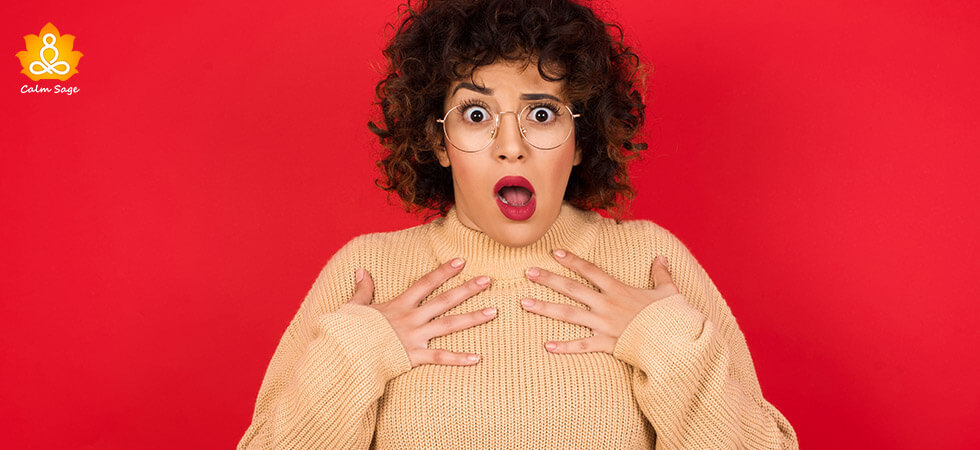Are You Overreacting? Here’s How To Tell And How To Stop Overreacting

“It is not our stress that kills us, it is our reaction to it.” – Dr. Hans Selye
Have you ever told yourself after reacting badly to a situation, “I may have overreacted”? It’s not an uncommon practice to overreact and trust me when I say this; what’s an overreaction to you, might just be an appropriate emotional response to someone else.
An emotional overreaction is valid and the one who experiences such high-intensity emotions often tries to minimize their reaction by telling themselves that they should not feel this way or should not have reacted that strongly.
These thoughts, while quite common, do not help much. Telling these phrases to yourself can’t help you find a solution. Before you learn how to control your overreaction, it’s important to understand that emotional expression (overreaction or not) is OK and valid.
However, if you feel that you often overreact to situations that might not deserve such a strong response, then below I’ve listed some helpful tips to help you stop overreacting. Before that, let’s take a look at the signs of overreacting and what might cause it.
Are You Overreacting? The Signs To Know!
Keep in mind that not every emotional reaction is an overreaction. Sometimes when things happen that are out of your control, experiencing strong emotions is common and even expected. If something happens that you can’t control, then it’s OK to feel anxious, fearful, and even angry. And equally important is feeling joyful when something good happens.
Here are some signs that you may be overreacting:
- You feel like you struggle to control your emotions
- You make a big deal out of even normal events
- You experience bodily changes (such as rapid heartbeat, abdominal distress, etc) when you’re emotional
- You feel irritable and on edge without a reason
- You have a difficult time understanding others’ feelings
- You often react with too much anger, yelling, and name-calling
- You find yourself disconnecting or dissociating from the present moment
There’s a difference between strong emotion and an overreaction. When a normal emotional reaction begins to affect your life negatively, it’s when it becomes an issue.
Example of Overreacting:
Your coworker fails to finish the task assigned to them which causes you to fall behind on your project. In this case, anger is justifiable but when the anger causes you to yell at them or physically attack them, it is then we can call it an overreaction.
These kinds of feelings are valid but when these feelings begin to affect your health and relationships, then they can be termed disturbing.
Did you know that various factors can contribute to overreaction including trauma and physical illnesses? Here are some of the common causes of overreaction:
- Mental disorders (including ADHD, anxiety, bipolar disorder, etc)
- Trauma disorders and PTSD
- Physical illnesses or injury
- Lack of physiological needs (including lack of sleep, hunger, etc)
- Lack of emotional needs
- Feeling disrespected
Here Are Some Tips To Stop Overreacting
When we talk about psychology, the way you manage your emotional reaction is called “emotional regulation”. This practice can involve reducing negative emotions, working on increasing positive emotions, or a combination of both.
Here are some tips for you to stop overreacting:
1. Identify The Triggers, First
The first thing to do is to identify the situations you overreact to most often. Do you overreact to the same thing again and again? For example, you’ve felt ignored by your parents and now when your partner ignores you, you overreact. Work on identifying your triggers and see how you can work through them.
2. Learn To Label Your Emotions
Another good way to stop overreacting is to label your emotions. Instead of just saying, “I’m upset”, try saying, “I feel disappointed because I failed to complete my task.” The more you label your emotions, the easier will it be for you to understand them and communicate your needs. This way, you’ll also decrease your emotional reaction and would learn to better handle your emotional overreaction.
3. Try To Feel The Opposite Emotion
In Dialectical Behavioral Therapy, there’s a technique called “Opposite Action”. This technique says that you must engage in behavior that’s opposite of what you’re feeling. For example, if you’re nervous before a job interview, try to pretend to be excited and confident. I’m not asking you to suppress your emotions but this technique allows you to remember that your emotional reaction can be changed and that you can control them.
4. Work On Your Communication
You can also try to improve your communication skills if you are looking for ways to stop overreacting. You need to listen to others without reading too much into the words or between the lines. You need to try using “i” statements rather than “You” statements. Try, “I feel disappointed in you,” rather than “You never listen to what I say!”
5. Find Healthy Ways To Vent
When you overreact, it’s easy to let your emotions take over. To control overreaction, you need to understand and find healthy ways to vent. These ways can include journaling your feelings or finding other ways that offer emotional catharsis. Art therapy can be a good choice too. The idea is to allow yourself to feel the emotions so that they don’t fester and cause an even bigger reaction.
6. Seek Professional Help
Sometimes, it’s not easy to control overreaction and during those moments it’s common to lash out. If you fear that you can’t control your emotional overreaction, then it’s recommended you seek professional help. A therapist can help you address your cause and find an emotional balance. DBT and CBT can help.
How To Help Someone Else From Overreacting?
If your loved one is prone to overreacting, then you need to respond with empathy instead of matching their emotional reaction. Try to use “I” statements. Such statements can help them feel heard instead of dismissed.
Then, make sure that you don’t respond with an emotional overreaction. If you react with the same emotional overreaction as your loved one then it’s likely to worsen the situation. If the situation becomes too much, then you need to walk away until your loved one calms down.
With little work, you can learn to control your overreaction. Remember, your emotions don’t control your reaction or overreaction. With the right steps you can learn to control your overreaction so don’t give up.
I hope these ways I’ve mentioned will help you learn how to stop overreacting. For more, you can write to us at info@calmsage.com or DM us on social media. You can also share your thoughts with us in the comments below.
Take Care!




















